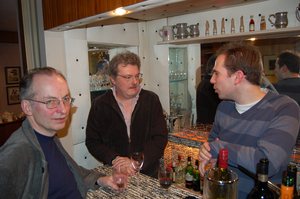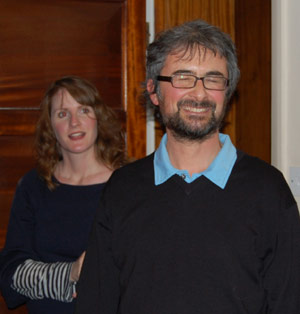We are developing the social individualist meta-context for the future. From the very serious to the extremely frivolous... lets see what is on the mind of the Samizdata people.
Samizdata, derived from Samizdat /n. - a system of clandestine publication of banned literature in the USSR [Russ.,= self-publishing house]
|
Hunter did something that none of us had the guts to do – he led the kind of life that secretly all of us would like to have the guts to lead. To hell with the whole thing, just stay drunk and high and smoke and hang out and write outrageous things. He’d never lived his life on anybody else’s terms.
– James Carville, chief strategist for Bill Clinton’s 1992 election campaign, on Hunter S. Thompson
Despite all the empirical evidence on the failure of Fairtrade, along with widespread criticism from august organs like The Economist, Alan Duncan appears to support the scheme in today’s Independent. Responding to a question, he says:
The Fairtrade set-up is a really good system. It stops exploitation, gives producers a start, and makes a serious contribution to the development of poorer countries.
But maybe he is not so supportive. For the question had two parts. He was asked whether it was a good idea and: “Do you buy any?”
He did not respond to the second part of the question.
On Saturday various Samizdata team members and associates descended upon HQ for copious amounts of wine, chilli and cheese.

The party commences.

The goddess Elena holds fort.

Samizdata’s infamous bar.

Tomas Kohl drops in on us from the Czech Republic.

China’s hottest export.

There’s something important on the computer.

Readers of Brian’s blog are surging.

The Briffas – Peter Briffa is the purveyor of the fine Public Interest blog.

By 3:30am, everyone had fallen asleep apart from the guardian hippo.
The welfare state has largely failed as an anti-poverty weapon… Higher welfare payments often encourage students to drop out of school, they often encourage families to disintegrate, and they often lead to lifelong dependency.
– Robert F. Kennedy
With technology, ubiquity is a virtue. People use Microsoft Word because everyone else does. The CD-Rom became a more popular backup device than the Zip, Jazz or SyQuest disk because there were lots of manufacturers involved. And, of course, floppies took far too long to die simply because they were everywhere, despite being evil unreliable and having a tiny capacity. Sony Betamax failed in part because far more movies were available for VHS. JVC was also proactive in licensing the VHS technology to lots of manufacturers. Consumers did not want to buy two different video players, so in the end most chose VHS simply because of its ubiquity.
Today, in the current format war between Blu-Ray Disc and HD-DVD, it seems that (unlike two decades ago) the Sony-backed format is going to win. This is despite the fact that Blu-Ray discs cost more to manufacture (although, arguably, Blu-Ray is the better format).
Why will Blu-Ray win? Because, firstly, Sony equipped every PlayStation 3 with Blu-Ray capability. Conversely, Microsoft (a major backer of HD-DVD) decided to only make it available as £100 add-on for its Xbox 360. Secondly, according to Wikipedia, as of late November there were 415 titles available in the US for Blu-Ray, compared with only 344 for HD-DVD. A search on WHSmith.co.uk brings up 259 results for “blu-ray”, but only 167 for “hd-dvd”.
Yet over the coming years, some of the companies that have benefited from the economics of ubiquity may find it turns round and bites them. With OpenOffice only ever a free download away, will people keep going to PC World and paying for Microsoft Office? Schools are already questioning whether it is a good to teach on expensive proprietary software in the classroom, when if they were to use open source applications, all the pupils would be able to practice with the same software at home.
Of the mainstream development charities, Oxfam is one of the better. Yes, it remains wedded to failed notions of ‘development aid’, but it is less shrill that many of the others. Its Oxfam Unwrapped initiative, where members of the public buy a Christmas present which goes to people in poor countries, strikes me as quite a good idea. Aid sent this way is certainly more likely to get to ‘real people’, rather than be sqandered by political elites like so much development aid.
But good intentions are not enough. Oxfam takes a perfectly good idea then ruins it by encouraging the gifting of goats. Goats are profoundly destructive to economic progress. They are the animal version of Robert Mugabe, destroying wealth and ripping up property rights, by destroying neighbours’ crops. They wreck agricultural land, turning fertile land into dust. As Lord Eden of Winton has said in the House of Lords:
Where there are large populations of goats, there is invariably poverty. Where there is poverty, there are invariably large populations of goats. Goats are marauding and indiscriminately destructive creatures. In his typically trenchant piece in last week’s Spectator, Matthew Parris described them as, “rank-smelling weapons of mass destruction”.
They destroy all vegetation, they kill reafforestation, they promote erosion and, in the long term, help to perpetuate poverty.
So why is Oxfam encouraging us to buy them for poor countries?
But Mark wants freedom for unhealthy things!
– one of the Liberal Democrat leadership candidates on today’s BBC Politics Show.
“The evidence is that when tariffs come down, tariff revenue tends to go up.”
– Peter Mandelson, EU trade commissioner, on why poor countries should liberalise trade
A few months ago a student called Oli Cooper wrote to me to say that he was setting up a Libertarian Society at University College London. I took him for lunch and he explained his plans and I explained how such groups had worked elsewhere. The society does not officially launch until September but there is already a website and a feisty blog called The Torch.
I learn from the blog that since 1997, there’s been the equivalent of one new criminal offence a day. He beats up the UK government’s plans for extending punishment without trial. In one post he agrees with the hard-right Tory clique the Cornerstone Group but explains, lest readers get the wrong impression, that normally the Group “represents just about everything that’s wrong with the Conservative Party. They’re Kinder, Küche, Kirche sort of authoritarians, keen on protecting the privileges of the elite.” Ouch.
I suspect we will be hearing a lot more from the UCL over the next couple of years.
They have their rules, and I have mine.
– Madsen Pirie
This morning I visited a Kenyan coffee co-operative (I am grateful to the Ministry of Trade & Industry for arranging this). They explained the liberalisation in the Finance Bill 2005 which came into effect last month, giving coffee co-operatives and farmers choice in who they deal with. Previously, they were not legally allowed to agree to sell coffee at a particular price to a particular company. They were only allowed to use one milling organisation: now they have a choice of three licensed milling organisations which have to compete.
Prior to liberalisation, the co-operative had to sell coffee through auction which is bad for farmers because they have very little idea how much they will get in advance. “The government made sure that middlemen took more money that farmers,” one representative said. (I have been told separately that co-operatives have often been swindled because they have no way of them knowing how much was really paid at auction.) Needless to say, the people at the co-operative are very happy at the new flexibility they have been given.
But they told me that farm inputs, which are imported, such as fertilisers, chemicals and machinery are barely affordable, which they blame on high tariffs.
Crossposted from the Globalisation Institute Blog.
On Saturday I got into a 4×4 and took part in a 460km road trip around rural Kenya. One of the most notable things in the journey were the frequent police roadblocks, each consisting of two rather sinister looking yellow metal strips on the road with spikes pointing upwards. These were accompanied by at least a couple of police officers.
Government sources tell me that they are essential in the fight against crime. On the other hand, ordinary citizens are rather more cynical, saying that criminals can bribe their way through them and that they are just a way of fleecing drivers who are made to pay fees. 99% of the time no receipt is given.
We were luckly. Apparently the police don’t like to try it on with 4x4s containing someone who is white and might be World Bank or a journalist. But for ordinary Kenyan drivers, the roadblocks are a menace, delaying journeys and breeding petty corruption.
(My visit to Kenya is being blogged here.)
|
Who Are We? The Samizdata people are a bunch of sinister and heavily armed globalist illuminati who seek to infect the entire world with the values of personal liberty and several property. Amongst our many crimes is a sense of humour and the intermittent use of British spelling.
We are also a varied group made up of social individualists, classical liberals, whigs, libertarians, extropians, futurists, ‘Porcupines’, Karl Popper fetishists, recovering neo-conservatives, crazed Ayn Rand worshipers, over-caffeinated Virginia Postrel devotees, witty Frédéric Bastiat wannabes, cypherpunks, minarchists, kritarchists and wild-eyed anarcho-capitalists from Britain, North America, Australia and Europe.
|










